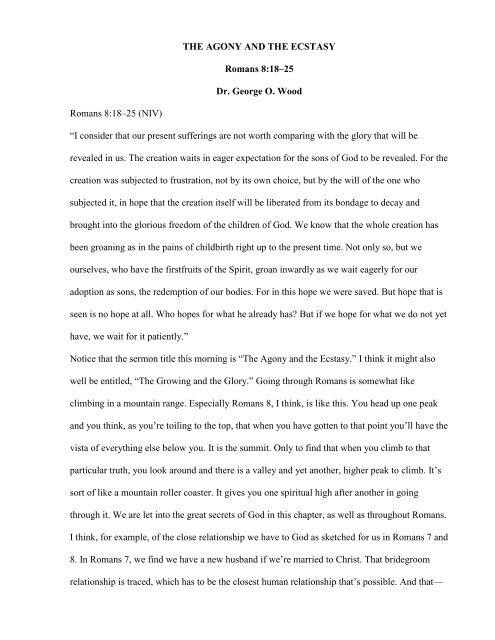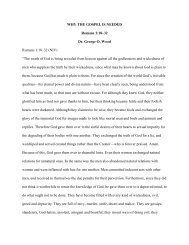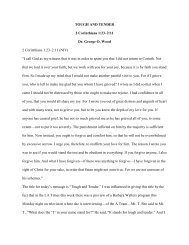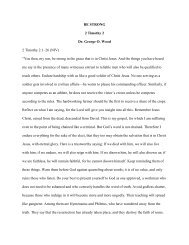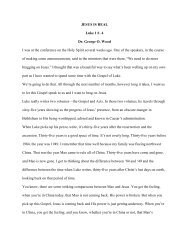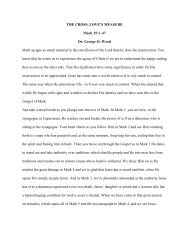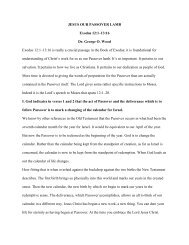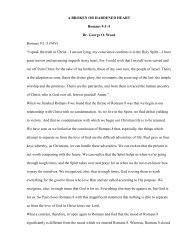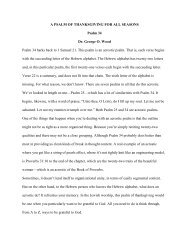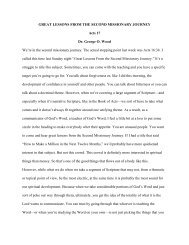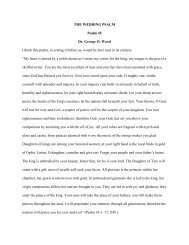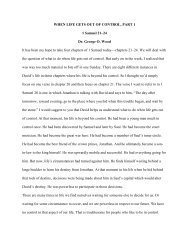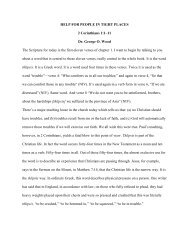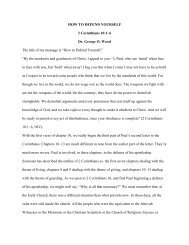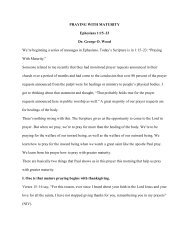17 THE AGONY AND THE ECSTASY.pdf - Dr. George O. Wood
17 THE AGONY AND THE ECSTASY.pdf - Dr. George O. Wood
17 THE AGONY AND THE ECSTASY.pdf - Dr. George O. Wood
You also want an ePaper? Increase the reach of your titles
YUMPU automatically turns print PDFs into web optimized ePapers that Google loves.
<strong>THE</strong> <strong>AGONY</strong> <strong>AND</strong> <strong>THE</strong> <strong>ECSTASY</strong>Romans 8:18–25<strong>Dr</strong>. <strong>George</strong> O. <strong>Wood</strong>Romans 8:18–25 (NIV)―I consider that our present sufferings are not worth comparing with the glory that will berevealed in us. The creation waits in eager expectation for the sons of God to be revealed. For thecreation was subjected to frustration, not by its own choice, but by the will of the one whosubjected it, in hope that the creation itself will be liberated from its bondage to decay andbrought into the glorious freedom of the children of God. We know that the whole creation hasbeen groaning as in the pains of childbirth right up to the present time. Not only so, but weourselves, who have the firstfruits of the Spirit, groan inwardly as we wait eagerly for ouradoption as sons, the redemption of our bodies. For in this hope we were saved. But hope that isseen is no hope at all. Who hopes for what he already has? But if we hope for what we do not yethave, we wait for it patiently.‖Notice that the sermon title this morning is ―The Agony and the Ecstasy.‖ I think it might alsowell be entitled, ―The Growing and the Glory.‖ Going through Romans is somewhat likeclimbing in a mountain range. Especially Romans 8, I think, is like this. You head up one peakand you think, as you‘re toiling to the top, that when you have gotten to that point you‘ll have thevista of everything else below you. It is the summit. Only to find that when you climb to thatparticular truth, you look around and there is a valley and yet another, higher peak to climb. It‘ssort of like a mountain roller coaster. It gives you one spiritual high after another in goingthrough it. We are let into the great secrets of God in this chapter, as well as throughout Romans.I think, for example, of the close relationship we have to God as sketched for us in Romans 7 and8. In Romans 7, we find we have a new husband if we‘re married to Christ. That bridegroomrelationship is traced, which has to be the closest human relationship that‘s possible. And that—
<strong>THE</strong> <strong>AGONY</strong> <strong>AND</strong> <strong>THE</strong> <strong>ECSTASY</strong>Romans 8:18-25when we‘re put into Christ—we have a new husband in Christ. We have a new name. We knowHis love, the love of a husband as only the bride can know it. We have the husband‘s wealth. Wehave the husband‘s future and his promise for success. We have his fortune. We have his glory.Then in Romans 8, we find our relationship with God is not now being traced as wife to husband,but we find our relationship being traced as son, or children, to father. We have been adopted bythe Father through Christ our Lord. This adoption is both objective, and it is subjective. If wehave come to Christ, it is objective in the sense that I don‘t have to feel it for it to be true. Indeed,as we traced last week, the Roman legal process was such that a person who went through theprocess of adoption was fully a member of the family and on equal footing with even the naturalchildren born to the family. God has only one perfect Son by nature. That is Jesus Christ. Therest of us have been adopted into the family of God, and we‘ve been made, therefore, joint heirswith Christ. But Paul goes on in Romans 8 to say, we‘re not only children of God objectively,but subjectively. We can feel it, for it is the Spirit of God himself bearing witness within ourhearts that provokes the response ―Daddy!‖ We can come to God in that familiar sort of a way:―Daddy, Father.‖I‘m tracing this background to get into the passage for today. When we look in Romans 7 andfind the model that we‘re the bride to Christ, and in Romans 8 that we are the sons of God, wemight well think, ―The bride gets a honeymoon, and the son, if he‘s a child, gets to play.‖ So itwould be easy to make the deduction, therefore, of the Christian life that it is all honeymoon andall play. And Paul must now come in at this matter and speak to believing Christians—both inthe first century and right now—to you and me in this room this morning. He must speak to usabout suffering. How then—if we are the bride of Christ and the sons of God—how do weexplain trial and trouble and sickness and suffering and death? Someone has sought to give a2
<strong>THE</strong> <strong>AGONY</strong> <strong>AND</strong> <strong>THE</strong> <strong>ECSTASY</strong>Romans 8:18-25quick answer to that question by saying of the Lord—a kind of modern paraphrase of the Lord‘swords—―Remember, I didn‘t promise you Disneyland!‖We look now at the connecting verse which leads us into the section for today. We found as weclosed last Sunday this in 8:<strong>17</strong>: ―If children, then heirs, heirs of God and fellow heirs of Christ ifwe suffer with Him in order that we also may be glorified with Him.‖ When we came to that, Italked about the meaning of that word ―provided.‖ Provided we suffer with Him, or if we sufferwith Him. That there are two ways that the word ―if‖ can be understood.I‘d illustrate it this way. Nearly six-and-a-half years ago now, when I was a pastor candidate forthis church, I could have made this statement: ―If I am pastor of this church, then I will preachsystematic, expository messages.‖ The word ―if‖ in that sentence was purely conditional. It wasconditioned on the fact that this congregation would want me to become pastor. But now if I saythe same phrase, ―If I am pastor of this church, then I will preach expository sermons on asystematic basis,‖ there is no question as to my status. So I‘m using it in a hypothetical sense and―if I‘m the pastor‖ can be translated or used, ―since I am pastor of this church.‖The reason why I use that is there‘s an important distinction in language that‘s being employedin 8:<strong>17</strong>. If we use the word ―if‖ in a conditional sense, it means that in addition to being justifiedby grace freely, to be a Christian, one also has to suffer. So if you are not suffering, therefore,you are not a Christian. That is not what Paul is saying, however. He‘s saying, ―Since you are aChristian, you‘re going through suffering.‖ In other words, suffering is an integral part of being abeliever in Christ. We want to try to get a handle on this and understand exactly what is involvedwith suffering.It is an escapable conclusion from all of the New Testament, and this passage included, that we,as believers in Christ, are not exempt from suffering. Jesus promised us in John 16:33: ―In theworld, you will have tribulation.‖ The word ―tribulation‖ describes kind of being in a vice, or in3
<strong>THE</strong> <strong>AGONY</strong> <strong>AND</strong> <strong>THE</strong> <strong>ECSTASY</strong>Romans 8:18-25pressure, that squeezes you. It‘s the sort of thing you‘d do to grapes when you put them in a winepress. You would subject them to tribulation. Someone would stamp on them and get all the juiceout. So in the world, expect this afflicting type of pressure. In Acts 14:22, when Paul is finishedwith his first missionary journey, Luke records that he and Barnabus went through the areastrengthening the souls of the disciples, exhorting them to continue in the faith and saying thatthrough many tribulations we must enter the kingdom of God.There are so many quotations. We could fill the whole hour with just quotations from the NewTestament on this subject. One other that I‘ll mention is 1 Peter 1:6: ―Now for a little while youmay have to suffer various trials.‖ There are really two kinds of suffering that are involved forthe believer.I. The first kind of suffering is the suffering which the believer experiences because of hislinkage or his identity with Jesus Christ.Paul says in 2 Timothy 3:12: ―Indeed, all who desire to live a godly life in Christ will bepersecuted.‖Sometimes the persecution or the suffering takes very subtle forms—such as ridicule andmisunderstanding of motivation and the like. I think of a modern, glaring example of Christianssuffering for identification with the cause of Christ is Anita Bryant, for example, whosefaithfulness to the gospel has exposed her to a heap of ridicule in the modern press and thesecular setting and the like. When one takes his stand as a Christian in direct contrast with thevalues and mores of the world, the educational system of the world—a person comes along in theuniversity setting and says, for example, ―I believe in creation‖—to say that in many settings isto be ridiculed. It‘s kind of the Athenian way of dealing with someone we don‘t like. We don‘tthrow stones at them like they do in some more primitive cultures. We just laugh them out of4
<strong>THE</strong> <strong>AGONY</strong> <strong>AND</strong> <strong>THE</strong> <strong>ECSTASY</strong>Romans 8:18-25existence and say, ―Don‘t tell me someone‘s still clinging to those Neanderthal types of views.‖So there is suffering as part of being a Christian.When you‘re in business and you decide not to cut corners, but to shoot straight and play fair.And when you‘re going through the grocery market checkout stand and find that they havemisread your bill and it came out to your good. And to be honest at that point and also take yourstand on the side of suffering for Christ‘s sake. It can be a very great suffering physically. It canlead to martyrdom. But it can also be something very small. But it‘s suffering because we areassociated with Christ.There is, however, a second kind of suffering.II. That suffering comes because of our association or linkage with the human race.This is the suffering which involves us, for example, in wars, in crime, in accidents, in geneticdefects, in sickness, in death—all of which Christians, from time to time, experience. The rainfalls on the just and the unjust. A friend of mine said after a severe car wreck a number of yearsago, ―We have found out that Christians are not exempt from car wrecks simply because they areChristians.‖ The difference between the Christian and the non-Christian in an automobileaccident is that Christ is with the Christian in that time.Christ, in His own experience of suffering, did experience suffering from both of these sources—His linkage with God and His linkage with humanity. His linkage with God resulted in Hiscrucifixion. But His linkage with humanity, the fact that He became flesh, also exposed Him tothe sufferings of poverty, to the suffering itself of physical death. In regard to this whole matter,therefore, of suffering—whether it‘s suffering we‘re experiencing because we‘re linked withChrist, or whether it‘s suffering we experience simply because we‘re mortal and must passthrough death and from time to time must pass through catastrophe or illness or accidents or the5
<strong>THE</strong> <strong>AGONY</strong> <strong>AND</strong> <strong>THE</strong> <strong>ECSTASY</strong>Romans 8:18-25like—how do we face into this kind of thing as the bride of Jesus Christ and as the children ofGod?The rest of chapter 8, from verse 18 on, is concerned with giving pastoral counsel to believers.The great Apostle Paul, the mighty theologian coming in on this pastoral level of concern, says,―Here is a handle by which you can get understanding, get strength, as you go through the timesof suffering.‖ He says four things. We‘re just going to look at one of them today. The first thinghe says in regard to suffering is there is a disproportion now between our suffering and the gloryto come. That‘s 18 through 25. I‘ll quickly look at the three other things he‘s going to say. Thenwe‘ll look at today‘s passage.The second thing he‘s going to say about suffering is that the Holy Spirit helps us in ourweakness, verses 26 through 27. The third thing he‘s going to say, in verses 28 through 30, isthat God is working all things for good. The fourth thing he will say about suffering is, in verses31 through 39, nothing can separate us from God.First he‘s saying in these verses today there is a disproportion between the suffering weexperience now and the glory which is to come. In verse 18, he states the principle. Often you‘llfind two kinds of logic or argumentation when you‘re advancing something. One is calledinductive, where you build all the elements of your case and you finally reach the conclusion.The other is deductive, where you reach the conclusion and then tell how you got to theconclusion. Here Paul is stating his conclusion first—verse 18—that the sufferings now at thepresent time are not worth comparing to the glory which is to come. Then he provides theillustrations as to what he means.So, first the principle. He says we have ahead of us the glory. Indeed, according to 8:30, whomGod justified, He also glorified. We‘re on the road. We‘re not yet all that God has for us. Isn‘tthat a wonderful thought? That alone can make the day!6
<strong>THE</strong> <strong>AGONY</strong> <strong>AND</strong> <strong>THE</strong> <strong>ECSTASY</strong>Romans 8:18-25How do we understand this word ―glory‖? What is waiting for us when we say that Christiansare going to go through an experience of glory. We‘re going to be glorified. Does this mean thatwe grab hold of a wire coming out of us, and we plug it into a socket, and we light up and haveluminescence? Maybe part of that might be involved. Remember Christ on the Mount ofTransfiguration—what happened to Him? Peter says, ―We beheld His glory.‖ What happened?His countenance became radiant as the sun. His garments became dazzling white, and there wasan electrification of beauty of Christ that was incredible as He was glorified in the presence ofHis disciples.But there is more involved in this than that. We see glory on a human level. For example, I enjoyit when people think well of me, and you do, too. We‘re looking for compliments. We‘re lookingfor assurance. We‘re looking for people to say to us—to reaffirm us—to say, ―You‘re doing agood job!‖ We seek glory. And we do it partly innately because we know, somehow as humanbeings, without even rationalizing it, that we were meant for approval. We were destined forglory, to receive honor of some kind. Jesus very clearly says in John 5 that the only way thisquest for glory can be fulfilled is to receive it from God. It can never be received from man.So to be glorified is to be, in the doctrinal sense, fully and entirely free from sin and evil and allof its effects in our body, our spirit, our soul. It is to be eternal. It is to be in a state of arrested,perfect development. That is, I am not now in a state of arrested development. I am on adegenerative scale, and so are you. I‘ve said this many times, and I‘m living proof that it‘s goingon. Arrested development means that we are put into a position of perfection—physically,spiritually, intellectually—and that is a radiance, a glory. We become like Christ in Hisresurrected body. When you look at one another, you are not looking at each other as you willyet be. When you see me, you haven‘t seen anything yet. As 1 John 3:2 says, ―Beloved, now weare sons of God.‖ Right now, we are sons of God. ―But it does not yet appear what we shall be.‖7
<strong>THE</strong> <strong>AGONY</strong> <strong>AND</strong> <strong>THE</strong> <strong>ECSTASY</strong>Romans 8:18-25Along with this great theme of glorification—we are headed toward a point of glory—is theinescapable linkage that is always made with suffering. Glory and suffering, as they‘re presentedin the Scripture, appear to be inseparable. Whenever the Scripture talks about glory, in the nextbreath the person who is writing the Scripture is talking about suffering.Someone has said the Scripture always links together hurts and hallelujahs. And we have seenthis already in Romans. For example, Romans 5:2: ―We rejoice in our hope of sharing the gloryof God.‖ Then, in the next beat, verse 3: ―More than that, we rejoice in our sufferings.‖ In verse<strong>17</strong> we have seen, ―If we are heirs with Christ, in order to be glorified with Him we must alsosuffer with Him.‖ And again in verse 18: ―The sufferings of the present time are not worthcomparing to the glory which is to come.‖ Paul says in 2 Corinthians 4:<strong>17</strong>: ―For this slightmomentary affliction is preparing for us an eternal weight of glory beyond all comparison.‖Literally, what he‘s saying is, ―For the momentary lightness of tribulation is preparing us for aneternal weight of glory.‖ The momentary lightness of tribulation. Remember, that‘s coming froma person who was stoned five times, shipwrecked three times, in trials, in dangers, and the like.And he‘s saying, ―this slight momentary tribulation is not worth comparing to the glory tocome.‖ It‘s his way of restating what‘s here in Romans 8—that when you compare the sufferingyou have now to the glory which is to come, it is a very light thing. Yet here, it seems so veryheavy.If you told me, for example, to go pick up a 200-pound object, that would be, I think, impossiblefor me. Some of you, no. But for me, yes. That would be extremely heavy. But if there weresome big scale in the room and this 200-pound object were put on the scale and nothing was onthe other side, then naturally the 200-pound object would floor that side of the scale. But if youwere to put a 10,000-pound object on the other side of the scale, what would happen? Of course,8
<strong>THE</strong> <strong>AGONY</strong> <strong>AND</strong> <strong>THE</strong> <strong>ECSTASY</strong>Romans 8:18-25the 200-pound object, by comparison with the weight on the other side, would be exceedinglylight.This is what Paul is saying. You have no idea, he says, as you face suffering, of the comparisonthat there is between what you‘re going through. He‘s not ridiculing what a person is goingthrough in suffering. He‘s not ridiculing martyrdom. He‘s not ridiculing death and disease andterminal illness and the suffering of accidents and the like. But he‘s simply saying, ―If you willlook at it from the development of the gospel—if you will look at it through the eyes of the openand empty tomb of the risen Christ—you will see that this momentary affliction, when comparedto the weight of glory, is indeed very, very slight.‖ Therefore, a doctrinal encouragement to us aswe pass through suffering—as indeed we will. However heavy your load is, as a believer, it isnothing to compare to the weight of glory that waits for you as a child of God.Paul goes on to illustrate the principle in verse 18—that the present suffering is not worthcomparing to the glory which is to come—in two ways. The first way he illustrates the principleis by saying something about creation.A. The suffering of creation itself is nothing compared to the glory that‘s coming to creation.Then he uses us as an illustration again. We, the firstfruit of the Spirit, also groan for theadoption, the redemption, of our bodies.1. So first, the illustration of creation. Verses 19-22 speak of this illustration that creationsufferings are nothing to be compared to the glory which is coming to the created world. Toreally get at this theme of creation, if we just watch the verbs, there are four verb passages. Theytell us a great deal of what Paul is developing. First of all, he says of creation that it waits witheager longing for the revealing, the apocalypse, the manifestation of the sons of God. That‘s us.Creation is out there waiting with eager longing for our unveiling. God is kind of like a greatArtist, a Sculptor, who‘s working on us, and He doesn‘t want to show His work yet because He‘s9
<strong>THE</strong> <strong>AGONY</strong> <strong>AND</strong> <strong>THE</strong> <strong>ECSTASY</strong>Romans 8:18-25not done with it. There are some who would like to get a peek behind the veil or behind thecanvas and see what God‘s working on. Because whatever God is working on is going to begreat when it‘s unveiled. There‘s something out there—creation—that‘s waiting for ourunveiling. And not just something simply waiting passively, but waiting with eager longing. It isliterally, the verb is ―watching with outstretched head.‖ Sort of like a turtle coming out of itsshell, looking around. This is sort of what Paul is saying about creation looking at us. It iscraning the neck, or standing on tiptoes. The first idea is creation. Notice the personification ofcreation. It‘s almost treated as if it were human. It‘s more than just an inanimate kind of world.Creation waits with eager longing.2. Then the second thing that Paul says about creation is that it was subjected to futility. That is,it‘s waited with longing because it was subjected to futility. Nature has not been able itself toattain the glory that it knows it‘s capable of. It wants that glory, but it lost its glory and it becamefutile. Of course, we here deal with basic scriptural passages like Genesis 3:<strong>17</strong>, where man andwoman fell away from relationship with God and nature itself became cursed because of manand woman. Something happened to the environment. The environment is inevitably linked upwith man. And of course we know this with the ecological crisis today, don‘t we? We know thatthe environment has something to do with man.And we find in Revelation 22:3: ―There shall be nothing anymore accursed in the new heavensand the new earth.‖ The curse will be lifted and nature will not be subjected to futility. I thinkPeter put the futility very well in the passage that says, ―The grass withers and the flowers fall‖(1 Peter 2:24, NIV). Futility. The beautiful flower, coming out for only a few days, and thendying. The animal life, the survival of the fittest. The struggle. And yet, the lack of meaning.Dogs on the way to the pound to be gassed. The futility within nature. Waiting for something tohappen that will break the cycle of decay and bondage to disease and the like. It was subjected to10
<strong>THE</strong> <strong>AGONY</strong> <strong>AND</strong> <strong>THE</strong> <strong>ECSTASY</strong>Romans 8:18-25futility in the hope. In the hope. God knew Jesus Christ was going to come into the world andbring about new humanity, and when that new humanity is finally unveiled creation itself will bethe ideal environment. It was when the first man was created. That is clearly what is being said inverse 21: ―will be set free.‖ Nature itself will be set free.We get an idea here by looking, for example, at the prophet Isaiah: ―The wolf will live with thelamb, the leopard will lie down with the goat, the calf and the lion and the yearling together; anda little child will lead them. The cow will feed with the bear, their young will lie down together,and the lion will eat straw like the ox. The infant will play near the hole of the cobra, and theyoung child put his hand into the viper‘s nest. They will neither harm nor destroy on all my holymountain‖ (Isaiah 11:6-9, NIV).Another beautiful passage, which speaks of this rejuvenation of nature: ―The water shall breakforth in the wilderness and streams in the desert. Burning sand shall become a pool and thirstyground springs of water‖ (Isaiah 35:6-7).And another passage from Isaiah 55:12: ―For you shall go out in joy and be led forth in peace,and the mountains and the hills before you shall break forth in sighing. The trees of the fieldshall clap their hands.‖3. What‘s going on? Nature is being liberated so it can fulfill all the tremendous, creative,beautiful functions designed for it by God. Its freedom is linked to us. Every year at springtime,creation tries to come alive. Creation tries to escape the futility of death and winter that it‘s beensubject to. Spring is to nature like New Year‘s resolutions are to us. Every year it‘s going to bedifferent. My New Year‘s resolutions months ago lay in shambles. Few of them are doing well.But at least I set the goals. If you don‘t make some of them, ok. But at least you tried. You willmake some of them. But spring is kind of like that New Year‘s resolution. It‘s trying, but it can‘tquite escape its cycle of decay and bondage. Even as our fate is linked to the fate of Christ‘s11
<strong>THE</strong> <strong>AGONY</strong> <strong>AND</strong> <strong>THE</strong> <strong>ECSTASY</strong>Romans 8:18-25B. The second illustration which he uses is us. He says, ―Not only creation is groaning, but weourselves who have the firstfruits of the Spirit groan inwardly as we wait for the adoption assons, the redemption of our bodies‖ (Romans 8:23).Remember, Paul has used this word ―adoption‖ back in verse 15. You‘re received the Spirit ofadoption. We indicated that, from God‘s eyes, it‘s like we‘re now in the orphanage, the legalpapers have all been signed, we‘re truly the sons and daughters of God by belief in Jesus Christ.But the day is coming when the Parent is going to pick this child up—which is His legally—andtake him to be with Him. Therefore, we are adopted, and we shall be adopted. Both kinds ofadoption are spoken of here. But in the meantime, we have the firstfruits of the Spirit groaningfor the redemption of our bodies. We have the firstfruits.We shouldn‘t just skip over scriptural words—there‘s a tremendous meaning in terms. This word―firstfruits‖ is one such word—especially since we haven‘t lived, most of us, in a farming kind ofan area. So what firstfruits are may be the first apples you buy when you go to the store. Thefirstfruits has its rootage in a scriptural feast (Leviticus 23:10–14). It was the feast which tookplace immediately after Passover. In fact, it occurred the Sunday after Passover Sabbath. As itworked itself out in Jewish history, what would happen was—and this was going on at the timeof Christ—on that first Sunday after Passover Sabbath, the chief priests would go out to a preselectedparcel of ground and there reap the first spring harvest of grain. It was the law ofLeviticus that no one in the country could eat from the spring harvest until this firstfruit had beenoffered to God. When the firstfruit had been offered to God, then everybody else themselvescould begin partaking in the benefits of the harvest. And the spring harvest would go on until itwas completed at Pentecost some fifty days later—or forty-nine days after Firstfruits.13
<strong>THE</strong> <strong>AGONY</strong> <strong>AND</strong> <strong>THE</strong> <strong>ECSTASY</strong>Romans 8:18-25The word ―firstfruits,‖ therefore, was used symbolically to speak of the fact that in theagricultural harvest, no one could partake of the benefit of that harvest until God had first beengiven the glory and the fruit. This term firstfruits is used of Christ.In 1 Corinthians 15, Paul says that Christ is the Firstfruit of those asleep. What does this mean?That no one could partake of the resurrection life, none of us could partake of the resurrectionlife—we couldn‘t eat it, we couldn‘t grab it—until the firstfruit had been offered to God. Andwho was the Firstfruit? None other than Christ himself. Since there is the beginning of theharvest, the harvest from death to resurrection has already started. It started in Christ. And it‘sgoing to go on until the age is consummated. And at the end of the age, we shall all join so thatthe harvest is completed.Now we who have the firstfruits of the Spirit—that is, the blessings of the Spirit—are to describethe age to come when there is no more bondage, no more disease, no more suffering of any kind.Already into our lives the Spirit has been given as an earnest, or a real estate payment whichinsures that the sale is going to be consummated. He‘s the down payment of our inheritance, thisresidence of the Spirit within us.We who have the Spirit of God also groan. This, to me, is the surprising paradox. You‘d thinkPaul would say we who have the Spirit of God, while waiting for the redemption of our bodies,do nothing but sing, rejoice, enjoy, and deny that anything hurtful exists. But we also, who havethe firstfruit of the Spirit, groan.God has not called us to be charismatic Christian Scientists. To say, ―Ignore suffering. By theconfession of your mouth, you can wipe it out of existence. So if you‘re sick, don‘t say you‘resick. If you‘re suffering, don‘t say you‘re suffering. It‘s not real. What‘s real is your confessionof faith.‖ And as always, there is a measure of truth in what is being said, but it does not escapethis fact that here even Paul is saying of spiritual believers, ―We also groan.‖ And why are we14
<strong>THE</strong> <strong>AGONY</strong> <strong>AND</strong> <strong>THE</strong> <strong>ECSTASY</strong>Romans 8:18-25groaning? Because we are linked with suffering. What kind of suffering are we linked with? Weare linked with suffering because of our identity with Christ, and we‘re linked with sufferingbecause of our identity as human beings. So we groan.But it is not the death groan. It is the groan which, after the groaning is completed, leads to thebirth of something new—and in this case, something better. Therefore, Paul says by way ofexhortation that as we groan inwardly, we are to have hope and we are to have patience. Hope,he says, is something you cannot see. Therefore, the necessity is that you not lose faith in themidst of this. For if you have it, then you wouldn‘t hope for it. For hope to exist, something mustnot yet be at hand. And it is a definite hope, not a wish. The Christian hope is not saying, ―I hopein the by-and-by, things will be better.‖ That is not hope. That is a wish. Hope is certain. It‘s justan event in the future, which has not yet occurred, but it is going to take place.I ran across in my reading this week a story that Martin Lloyd-Jones told. He was an Englishpreacher, and he‘s written three 450-page books on Romans 8 alone. It‘s kind of been a feast toget into him a little bit and not just stand up and copy him, which I‘ve sought to avoid. He had anold friend of his who had died about the time that he said was a young minister, an elderly Welshminister who died in 1929. He relates a story that this minister friend of his had told when he wasa younger man. He said that after his mother had died, he was looking through her papers andbelongings. In a very old book, he came across a little sheet of paper on which he found that oneof his sisters had written certain words. She was between ten and twelve years of age when shewrote these words. Their father had died, and on the day of his death this little girl had writtenthese words on a piece of paper and had put it in the little book. She said, ―Today Da-da has leftus. He has gone into the glorious liberty of the children of God.‖ A girl of twelve in the sixties ofthe last century could write like that. Why? She understood what Paul was saying—that thepresent suffering was not worthy to be compared to what was coming, and that the creation waits15
<strong>THE</strong> <strong>AGONY</strong> <strong>AND</strong> <strong>THE</strong> <strong>ECSTASY</strong>Romans 8:18-25to enjoy the liberty which is to be enjoyed by the children of God. Just as with the word ―glory‖we have the word ―suffering,‖ so when we have the word ―hope‖ we have the word ―patience.‖ Itis the counterbalance point. And patience here is not something which is passive, a sitting downand saying, ―Whatever will be will be; whatever is going to come to pass is going to come topass.‖ But the idea of patience is an active, enduring kind of a spirit—which balances eagernessand passivity—which is a great word that means ―to endure in the midst of pressure and bestrong.‖So Paul is saying to us in our sufferings as believers, ―Have you considered—that is, have youreckoned it intellectually with your mind, have you considered—that the sufferings of the presentare not worth comparing to the glory which is coming?‖ This kind of an answer, a positiveanswer could only be made by a believer. For it is the believer in Jesus Christ who holds the keyof what God is going to do in the future.A real contrast is a little paragraph I read on <strong>Wood</strong>y Allen which sharply sets this in relief. Thewriter of this article, who is talking about life after death said, ―The man who makes us laugh,<strong>Wood</strong>y Allen, has publicly disclosed his morbid preoccupation with death. As an atheist, he doesnot believe in human survival after death. In philosophical moments, he soars to language likethis, ‗The fundamental thing behind all motivation and all activity is the constant struggle againstannihilation and against death. It‘s absolutely stupefying in its terror, and it renders anyone‘saccomplishments meaningless. As Camus wrote, ―It‘s not only that man dies, but that hestruggles to do a work of art that lasts and then realizes that the universe itself is not going toexist after a period of time.‖‘‖ Since the interviewer was seeking to comfort Allen, he asked,―But aren‘t you happy that you will achieve immortality through your achievements?‖ Gloomprevailed in <strong>Wood</strong>‘s retort. ―Who cares about achieving immortality through achievements? I‘minterested in achieving immortality through not dying.‖16
<strong>THE</strong> <strong>AGONY</strong> <strong>AND</strong> <strong>THE</strong> <strong>ECSTASY</strong>Romans 8:18-25And what an open invitation for the gospel that statement presents. Because it is this that Jesuscame to speak to, to the humor of <strong>Wood</strong>y Allen, to the pathos of a person going throughsuffering. Christ is saying that when we are linked with Him, whatever we go through here is notgoing to be lost. It‘s just not worthy of being compared to the glory which is coming.Closing PrayerOur heavenly Father, as we approach the time of communion now we remember the Scripturethat says to us that You, who for the joy that was set before You, endured the cross. So what wehave been teaching today from Your inspired Word, we can say with confidence, has alreadybeen modeled by You. That You do not suffer in despair. That You counted the moments inGethsemane, the moments at Calvary, as unworthy to compare to the glory which would bemanifested and come upon You. We also think, Lord, of words like, ―No cross, no crown.‖ Howwe are called to be linked with You in Your suffering. And that just as surely today as we sit inthis room and share communion together and recollect—even while we sit here—some of thepains and the agonies we‘re going through in our mortal existence as Christians, we know,because we have this hope in us, that there will come a day when we will sit around a tablewhich is perfect in its setting, and we will partake together. And the banquet of eternity will beushered in, and the glory which is there will swallow up anything we ever experienced here. Andfor ages unending, we will finally find the words to say what our spirit has often wanted to sayand has never been able to articulate, because language cannot express what we feel. But finally,glory will be given to us in a completed form. And we who wait for that moment give thanks toYou that You have already sent the Spirit into our hearts to bring testimony with our spirit thatwe are the children of God—and giving us the liberty at these moments to say to You, ―Daddy.‖In Jesus‘ Name. Amen.<strong>17</strong>


